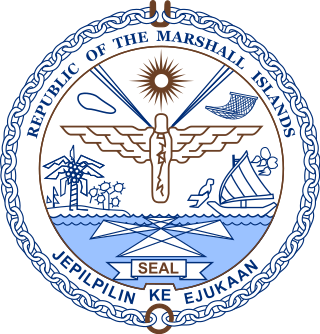Austronesian settlers arrived in the Marshall Islands in the 2nd millennium BC, but there are no historical or oral records of that period. Over time, the Marshallese people learned to navigate over long ocean distances by walap canoe using traditional stick charts.

The New Jersey Legislature is the legislative branch of the government of the U.S. state of New Jersey. In its current form, as defined by the New Jersey Constitution of 1947, the Legislature consists of two houses: the General Assembly and the Senate. The Legislature meets in the New Jersey State House, in the state capital of Trenton.
A supermajority is a requirement for a proposal to gain a specified level of support which is greater than the threshold of one-half used for a simple majority. Supermajority rules in a democracy can help to prevent a majority from eroding fundamental rights of a minority, but can also hamper efforts to respond to problems and encourage corrupt compromises at times when action is taken. Changes to constitutions, especially those with entrenched clauses, commonly require supermajority support in a legislature. Parliamentary procedure requires that any action of a deliberative assembly that may alter the rights of a minority have a supermajority requirement, such as a two-thirds vote. In consensus democracy the supermajority rule is applied in most cases.

Iroijlaplap Amata Kabua was the first President of the Marshall Islands from 1979 until his death in 1996.
Elections in Luxembourg are held to determine the political composition of the representative institutions of the Grand Duchy of Luxembourg. Luxembourg is a liberal representative democracy, with universal suffrage guaranteed under its constitution. Elections are held regularly, and are considered to be fair and free.

The Arizona State Legislature is the state legislature of the U.S. state of Arizona. It is a bicameral legislature that consists of a lower house, the House of Representatives, and an upper house, the Senate. Composed of 90 legislators, the state legislature meets in the Capitol Complex in the state capital of Phoenix. Created by the Arizona Constitution upon statehood in 1912, the Arizona State Legislature met biennially until 1950. Since then they meet annually.
A House of Chiefs is a post-colonial assembly, either legislative or advisory, that is recognised by either a national or regional government as consisting of and providing a collective, public voice for an ethnic group's pre-colonial authorities. Although often influential within the indigenous culture, its members do not usually function as a modern nation's primary law-making body, being neither representative nor consisting of members appointed individually by the government in power, whether democratic or not. It consists of all or some of the "traditional leaders", historically kings and chiefs, of a country or a sub-division thereof.
Iroijlaplap are the traditional paramount chiefs in the Marshall Islands. Ordinary chiefs bear the title of Iroij ; -ļapļap is a superlative suffix.

The Northern Mariana Islands Commonwealth Legislature is the territorial legislature of the U.S. commonwealth of the Northern Mariana Islands. The legislative branch of the territory is bicameral, consisting of a 20-member lower House of Representatives, and an upper house Senate with nine senators. Representatives serve two-year terms and senators serve four-year terms, both without term limits. The territorial legislature meets in the commonwealth capital of Saipan.

The Legislature of the Marshall Islands has 33 members, elected for a four-year term in nineteen single-seat and five multi-seat constituencies. The last election was November 20, 2023. Elections in the Marshall Islands are officially nonpartisan, but most members of the Nitijeļā are affiliated with one of the four active political parties in the Marshall Islands: Aelon Kein Ad (AKA), Kien Eo Am (KEA), United People's Party (UPP), and United Democratic Party (UDP).

The House of Assembly of the British Virgin Islands, until 2007 known as the Legislative Council, has 15 members: 13 directly elected for four-year terms, and two ex officio members.

The government of the Marshall Islands operates under a mixed parliamentary-presidential system as set forth in its Constitution. Elections are held every four years in universal suffrage, with each of the 24 constituencies electing one or more representatives (senators) to the lower house of RMI's unicameral legislature, the Nitijela. The President, who is head of state as well as head of government, is elected by the 33 senators of the Nitijela. Four of the five Marshallese presidents who have been elected since the Constitution was adopted in 1979 have been traditional paramount chiefs.

Constitutional Convention elections were held in the Marshall Islands in November 1976.

The Transitional National Legislature of South Sudan is the legislature of South Sudan. The Transitional National Legislature consists of the Transitional Council of States and the Transitional National Legislative Assembly.

Constitutional Convention elections were held in the Marshall Islands on 21 February 2017.
Iroij Namo Hermios was a Marshallese chief and politician. He served as a member of the House of Representatives of the Trust Territory of the Pacific Islands between 1965 and 1968, and as a member of the Marshall Islands Legislature until his death.

The Constitution of the Marshall Islands is the supreme law of the Republic of the Marshall Islands, in force from 1 May 1979.
A constitutional referendum was held in the Marshall Islands on 20 November 2023, alongside general elections. Citizens voted on amendments to the constitution proposed by parliament and approved by the convention elected in 2017.








